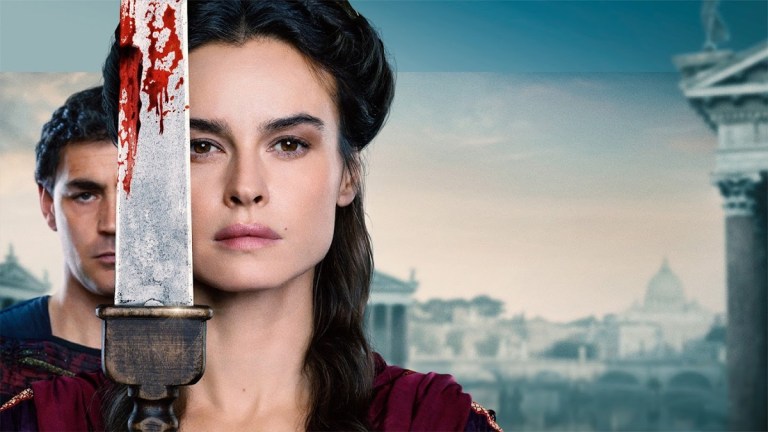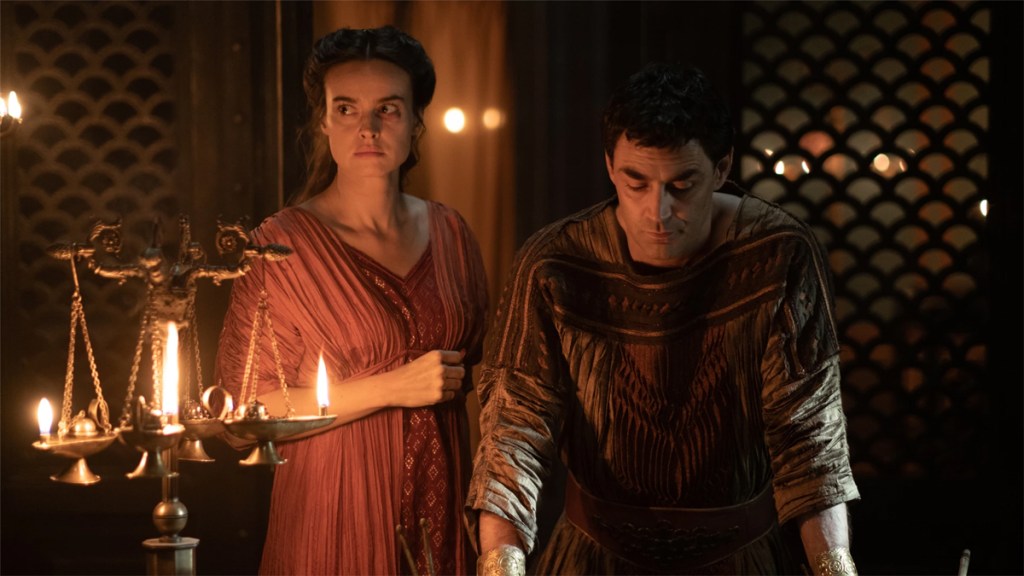Sky’s Domina is the Best Historical TV Drama Since Rome
Backstabbing, intrigue, sex, and death in a royal household? Fans of Succession, Peaky Blinders, House of the Dragon and Game of Thrones should get stuck in.

Everyone knows the problem: there’s too much really good TV these days, and not enough time to watch it all. But if you’re a fan of gripping, adult drama that follows twisted, complicated relationships with high stakes, it’s well worth putting aside a few hours of your time to watch Sky Atlantic’s Domina.
Domina is the story of Livia Drusilla, the wife of the first Roman Emperor, Augustus (Julius Caesar was technically a Dictator, not an Emperor). The historical Livia is a truly fascinating character. Her father fought and died with the assassins of Julius Caesar, she endured a siege with a toddler, then she ended up married for 50 years to the man whose army was on the attacking side in both cases. She had more power and influence than any other woman in Roman history and worked together with Augustus to help him rule, but his reign was peppered with the untimely deaths of multiple family members, and his successor, to her disappointment, was decidedly less keen on working together with a woman. Her great-grandson Caligula called her “Ulysses in a dress”.
It is only surprising that there haven’t been more TV shows made about her. She crops up in miniseries about her husband every now and again and she has a small role in the rushed ending to the 2007-2009 BBC/HBO series Rome, but to date, her biggest and most memorable TV appearance has been in the BBC’s 1976 adaptation of Robert Graves’ novel I, Claudius. Domina is finally here to correct that and give her the starring role she deserves.
A Must for House of the Dragon Fans
We probably don’t need to sell this show to fans of Rome or I, Claudius. It’s clearly influenced by them in a good way, and it also fills in a time period left mostly untouched by either of them. There is some overlap, but much of this series takes place in the 20s, tens, and noughties BCE, a period rarely covered by drama but in which there is lots going on. The series has a similar tone to both earlier shows, and while it focuses primarily on the Imperial household like I, Claudius does, it features far more well-rounded enslaved and formerly enslaved characters and has a very similar mood, tone and feel to Rome.

But you don’t have to be into Roman history or period dramas to enjoy this show. It will appeal to fans of Peaky Blinders’ later seasons with its mix of sex, violence, and politics. And the general theme of backstabbing among rich and powerful people will probably be a selling-point for fans of Succession or House of Cards.
If you’re a fan of House of the Dragon, this is a must-watch, and not just because it shares an actor with that show (Tom Glynn-Carney, who plays Aegon Targaryen, plays Young Gaius here, and Game of Thrones’ Liam Cunningham shows up as Livia’s father as well). Like George RR Martin’s political drama, and to a lesser extent like Game of Thrones before it, this is a series about backstabbing, intrigue, sex, and death in a royal household. There is plotting, there are secrets, characters’ personal relationships get twisted and tangled and messy, and no one can ever fully trust anyone else. The stakes are the fate of the whole Empire, decided in back rooms and bedrooms and dining rooms, and hardly anyone dies a natural death. Okay, there are no dragons, but if you just can’t wait until 2024 for another dose of Machiavellian plotting, this will scratch that itch.
A New Take on Livia
Not only is Livia seriously under-represented in drama considering how important and interesting she is, this series also offers a new take on her character that keeps it feeling fresh. Livia’s history is a complex mix of actual facts (not as many as you might think), real ancient rumours (lots of them), and the enduring legacy of the character Robert Graves created out of the two, which is so fun and fascinating to watch it dominates all subsequent versions. In fact, Graves’ Livia has a bigger reach than that, influencing everything from Rome’s scheming take on Augustus’ historically not-very-interesting mother to The Sopranos’ ruthless matriarch who was named after her.
This version is a little bit of all three. There are definitely bits of Graves’ Livia in there, and of the manipulative character the Roman historian Tacitus called “a bane to the state and a bane to the house of the Caesars”. That character is too much fun to do away with, and viewers with any knowledge of the other shows will expect it, even though it might bear little or no relation to who the real person actually was. But her motivation has been switched around, so that the driving force of this Livia is more sympathetic, and equally interesting. For anyone who thinks they know this story, the show has a few surprises up its sleeve.
You’ll Learn a Bit of History
No historical drama is completely historically accurate (that would be both boring and, given the state of the evidence for this period, impossible) but Domina comes as close as any, and closer than Rome. Taking full advantage of the fact the historical records are all rumour, gossip and hearsay, and no one really knows what was going on in the Imperial household (least of all the Imperial family members themselves), the show often gives us secret different versions of events to “reality”, but it only rarely includes anything that is definitely not true. It all might have happened like this. It also gives fully rounded characterization to far more members of the Imperial family than usual, though poor old Maecenas, the third wheel in Augustus and his bezzie mate Agrippa’s world-conquering partnership, is still something of a non-entity.

By focusing on a female character rather than, as is more usual, one of the Emperors, you’ll also find yourself sneakily learning all sorts of bits and pieces of Roman culture that don’t usually make it into TV dramas. Granted, the dialogue explaining it can be a bit clunky (“that’s the law” / “I know, but the audience doesn’t, so we have to spell it out”) but the life of a Roman woman is shown in more detail here than anywhere else, including arranged marriages, spending your twenties and thirties constantly pregnant, having no rights over your children if you get divorced, and no formal political power, but a lot of behind-the-scenes power. The series is also careful to make sure everything is clearly comprehensible for viewers with no knowledge of the history; for example, rather than tracing Augustus’ confusing ever-changing names throughout this period, everyone just calls him by his first name, Gaius, which is a neat and elegant solution.
Confusing? Sometimes. But Always Compelling
No show is perfect, and interestingly Domina has one of the same flaws as House of the Dragon, as well as sharing its good points. The main characters have all been double-cast with younger and older versions, but the time skip between the two is initially only 11 years and the change in casting is disconcerting. Having got used to one set of actors and liked them a lot, readjusting to get used to another set takes an episode or two, though the older actors are equally good so by the time season two rolls around, this stops being a problem. The way it’s done is a little strange too; the title character’s accent completely changes with the time skip, and one character is recast again for season two while another is killed off abruptly for no apparent reason, but everyone else is the same. And the time skip itself completely hops over the most famous and exciting part of the history; Augustus’ war with Antony and Cleopatra. Antony is an important character for the first few episodes and then, whoops, he fought a war against the main characters and married the Queen of Egypt and then died but you don’t need to see any of that. It’s a unique choice, we’ll give it that.
These are minor gripes, though. While it can be slightly grim viewing at times (that’s not the show’s fault – you can blame history for that), this is a really compelling drama. Well written, well acted, beautifully filmed – like Rome was – at the historic Cinecittà studios in Rome, this is a story you can really get absorbed in, as it draws you into its intricate, knotty world of love and sex and death.
Domina season 2 starts on Sky Atlantic and NOW in the UK from Wednesday September 13th at 9pm. It’s available to stream on MGM+ in the US.
